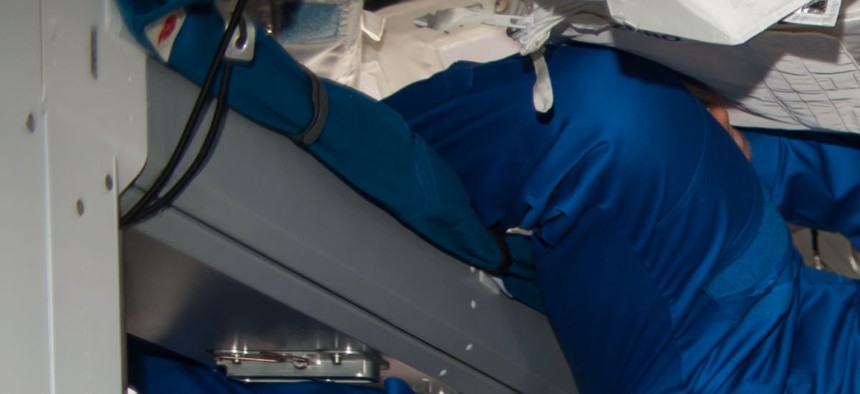
NASA photo
An Astronaut’s Life: Hyperscheduled and Bureaucratic
What it’s like to work on the International Space Station.
What is the most bureaucratic, rule-bound workplace in the world? It turns out it might be one that’s actually floating above the earth.
In the latest issue of The Atlantic, James Fishman takes a fascinating look at life aboard the International Space Station. “All day, every day, half a dozen men and women, including two Americans, are living and working in orbit, and have been since November 2000,” he writes. Life aboard the immense outpost presents a host of ongoing challenges, from figuring out how to get regular exercise to avoid loss of bone density to devising a means of sleeping without floating throughout the cabin.
There’s no laundry, very little fresh food, and much work to be done. And it turns out that work is rigidly controlled by NASA officials at Mission Control in Houston. Fishman writes:
Every day starts and ends with a daily planning conference, during which the astronauts briefly check in with all five control centers around the world to talk about schedule glitches or pending maintenance, or look ahead to the next day. (NASA has a second facility, in Huntsville, Alabama, to handle scientific research; Moscow has a Mission Control for the Russian half of the station; and the European Space Agency and Japan’s space agency also have their own 24-hour control centers.) The astronauts may be rocketing around Earth at 17,500 miles an hour, 10 times faster than the average bullet leaves a gun, but they can’t escape regular meetings.
And it’s not just meetings:
Life on the station is managed via spreadsheet: every minute of each astronaut’s workday is mapped out in blocks devoted to specific tasks. When an astronaut clicks on a time block, it expands to present all the steps necessary to perform the task at hand—whether it’s conducting an hours-long experiment on the behavior of fire in zero-G or stowing supplies from a cargo ship.
Simply building the daily schedule for the astronauts requires a staff of 50 on the ground. And the mundane process of trying to follow the often-unrealistic demands they set is a frequent source of frustration for astronauts.
It seems that some things don’t change even if your workplace is literally out of this world. “As with anything else,” Fishman writes, “the privileges and joys of working in space don’t neutralize ordinary office politics.”
NEXT STORY: Rand Paul Airs His Grievances Against Government







